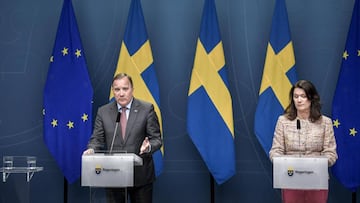Sweden's herd immunity plan: is it working?
Swedish epidemiologist, Johan Giesecke, has hailed Sweden's herd immunity plan as "the best in the world", while the WHO believes it is reckless and dangerous.

Both Sweden and the UK stirred controversy with their respective governments choosing to follow the herd immunity plan rather than strict lockdown measures introduced in other European countries like Italy, France and Spain to tackle the coronavirus.
And while the UK was quick to scrap the idea, Sweden continued with the herd immunity plan, with Johan Giesecke, the nation’s former chief epidemiologist and internationally recognised expert who advises the World Health Organization, describing the strategy as the “best in the world”.
However it hasn’t been a free-for-all. The Swedish government did implement some restrictions, such as a ban on gatherings of over 50 people and social-distancing rules in gyms, restaurants and bars, which like nurseries and schools for children under 16, have remained open. The majority of the Swedish population, who were asked to practice social distancing on a mostly voluntary basis, approve of the approach, with polls indicating that two-thirds believe the government has done a good job.
However with 3,679 deaths and a mortality rate three times higher than that of Denmark and seven times higher than in Finland, many believe that Sweden’s strategy is far from the best in the world. But it must be noted that Sweden’s mortality rate has been much lower than that in Britain, France and Spain, all of which have enforced strict lockdown measures that will have lasting economic impacts.
Follow our live coverage of coronavirus news as it breaks
Coronavirus lockdown measures “pushing deaths into the future”, says Dr. Giesecke
According to Dr. Giesecke, lockdowns are solely a means of delaying the inevitable. “You’re pushing your cases and deaths into the future, they are not disappearing,” he said speaking to New Zealand media at the weekend.
Although health authority leaders in the likes of Spain and Italy would argue that the lockdown measures were necessary to slow the spread and stop the collapse of their respective health systems.
While populations in other European countries begin to move about again as lockdown restrictions are eased, which will likely lead to a rise in covid-19 cases and deaths once again, Stockholm will reach herd immunity (the 40-60% rate of infection needed to prevent spread of the coronavirus), by June, according to Dr. Giesecke. The assumption is that when countries count the death toll a year from now, their figures will be similar, regardless of the measures taken, although the economic damage in Sweden will be far less.
Results so far of Sweden's relatively lax approach to combatting the coronavirus: lots of deaths and not much economic benefit https://t.co/NIKaFaVuLn pic.twitter.com/b6lTp346n3
— McKay Coppins (@mckaycoppins) May 10, 2020
Criticism for Sweden’s coronavirus plan
However Dr. Giesecke’s counterparts at Johns Hopkins University have called herd immunity a "dangerous misconception", while the World Health Organization also re-iterated its objections to herd immunity last week.
"This idea that, 'Well, maybe countries who had lax measures and haven't done anything will all of a sudden magically reach some herd immunity, and so what if we lose a few old people along the way?' This is a really dangerous, dangerous calculation," Mike Ryan, WHO's executive director of health emergencies, said.
Related stories
"I think we need to be really careful when we use terms in this way around natural infections in humans because it can lead to a very brutal arithmetic which does not put people and life and suffering at the center of that equation.”
While the general consensus among international health experts is that herd immunity is a reckless and dangerous policy to follow, many citizens in the U.K, U.S. and other countries, whose lives, jobs and businesses have been ravaged by lockdown measures, will be demanding their governments to look towards Sweden. But only time will tell whether Sweden’s strategy was better than other countries.

